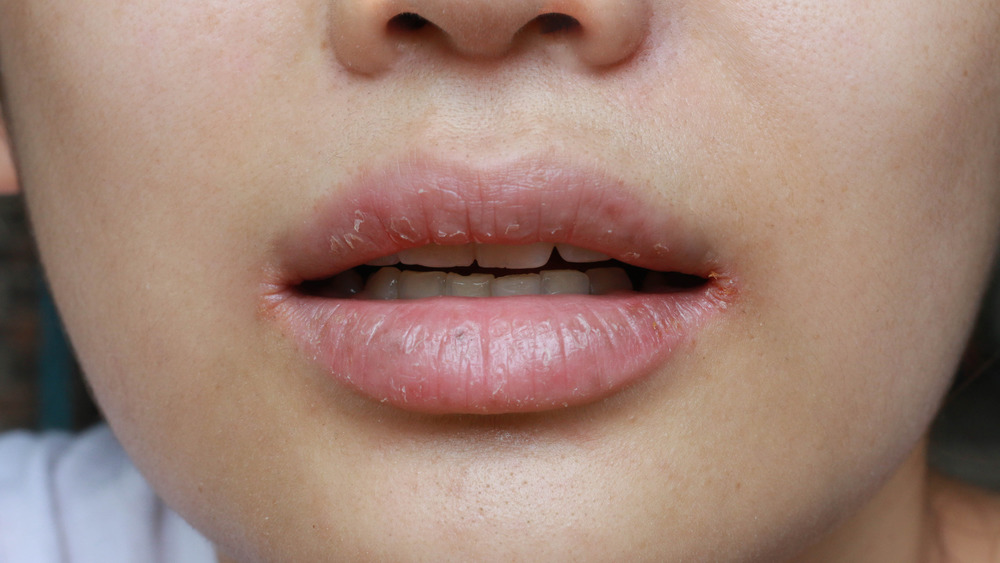The Real Reason Your Mouth Is Dry
If your mouth feels as dry as a desert, you might have dry mouth, also known as xerostomia. Dry mouth means your mouth isn't creating enough saliva, necessary for taste, dental health, and breaking down food. You're probably sipping on water more than usual, and your mouth and throat almost always feel dry or sore. You might even experience cavities, since saliva keeps your teeth and gums healthy.
Dry mouth symptoms are dry throat, sore throat, chapped lips, trouble speaking, change in taste, dryness, thick saliva, trouble chewing or swallowing, bad breath, and difficulty wearing dentures, according to Healthline and the Mayo Clinic.
Causes of dry mouth include certain medications, aging, cancer treatments, nerve damage, tobacco or alcohol use, recreational drug use, and other health conditions. There are hundreds of medications with dry mouth as a side effect, but the most common medications are depression, anxiety, high blood pressure, pain, muscle relaxants, decongestants, and antihistamines.
Health conditions that cause dry mouth include autoimmune diseases, cystic fibrosis, Alzheimer's disease, thrush, stroke, or diabetes. Breathing with your mouth open and snoring can also cause dry mouth.
According to the Mayo Clinic, dry mouth can lead to an increase in plaque, gum disease, tooth decay, mouth sores, thrush, cracked lips, sores or split skin in the corners of your mouth, and poor nutrition from trouble chewing and swallowing.
What do to about dry mouth
If you think you might have dry mouth, you need to see your doctor, who will review any medications you're taking, any possibly-related health conditions, and any other reasons for the dry mouth you're experiencing. Your doctor will also examine your mouth. Typically, your doctor can determine a diagnosis from this information. However, you might need scans of your salivary glands and some blood tests to determine the cause. If your doctor suspects the reason is Sjogren's syndrome, for example, they will do a biopsy of your salivary glands to send for testing.
If medication is causing it, your doctor can switch you to a medication that doesn't cause dry mouth or alter your dosage. Treatment for dry mouth includes over-the-counter mouth rinses that contain artificial saliva or moisturizers. Those with xylitol are especially helpful, like Biotene Dry Mouth Oral Rinse. You can also find dry mouth gums and mouth sprays for when you're not able to rinse.
Treatments for severe dry mouth include prescription medications such as Salagen or Evoxac, which will stimulate saliva production. Another treatment for severe dry mouth is nightly fluoride trays, fitted by your dentist, and which you'll fill with fluoride at home and wear at night. Your dentist may also have you use a chlorhexidine rinse once a week to limit cavities.
Home remedies for dry mouth
Before getting into home remedies for dry mouth, it's essential to see your dentist every six months for a checkup and cleaning. According to Healthline, dry mouth causes a lack of saliva production that can lead to gum disease and tooth decay. Maintaining good oral care by brushing your teeth and flossing every day can help prevent tooth decay and gum disease caused by dry mouth.
There are some things you can do at home to soothe your dry mouth. Sip water, suck on ice cubes or ice chips and drink water during your meals to keep your mouth moist. Avoid alcohol, tobacco, and caffeine, which can further dry your mouth. Reduce your sugar and salt intake. Use a dry mouth rinse, toothpaste, mints, gum, and spray that contains xylitol. Try using a humidifier in your bedroom to help reduce dry mouth while you sleep, and try to sleep with your mouth closed. Keep your lips moisturized to prevent dry, cracked lips.



